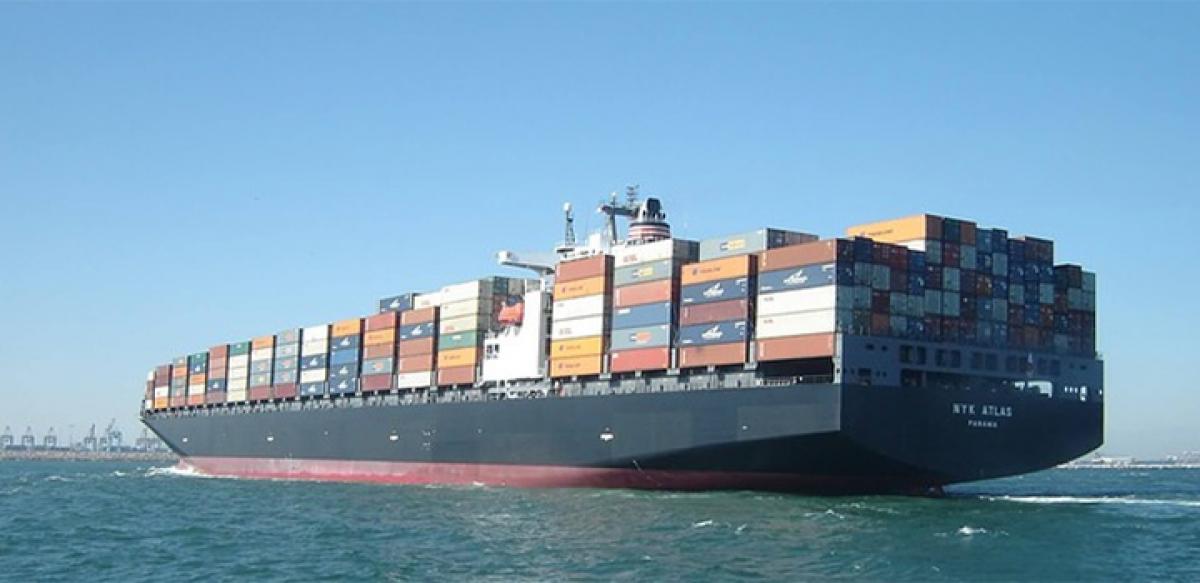Live
- Will keep our promise of developing Channapatna: DCM
- Don’t collect excess fee from students
- Double registration leads to enmity between two parties
- JD(S) first family avoids discussion on bypoll debacle
- Hari Chandana’s Green Initiatives: Transforming Hyderabad for a better Future
- Gangavati railway station to be renamed Anjanadri: MB Patil
- Bhool Bhulaiyaa 3 Continues to Dominate the Box Office, Grossing Rs 247 Crore
- Nature’s Basket opens B’lore’s largest artisan pantry store
- Top Strategies for Achieving Work-Life Balance and Well-Being
- PM Modi appreciates Early Bird’s efforts
Just In

The world\'s 90 per cent of goods and commodities are today traded via oceans. As India firmly integrates with the global economy, dependence on oceans for prosperity and security increases. But, India is yet to fully realise the potential of our maritime resources. The International Fleet Review underway in Visakhapatnam emphasises the importance of India’s maritime presence.
The world's 90 per cent of goods and commodities are today traded via oceans. As India firmly integrates with the global economy, dependence on oceans for prosperity and security increases. But, India is yet to fully realise the potential of our maritime resources. The International Fleet Review underway in Visakhapatnam emphasises the importance of India’s maritime presence.
India's geographical location, athwart the major shipping routes of Indian Ocean, provides it with a pivotal maritime role. For this to happen, India should reorient its thinking. Our concept of neighbours should appreciate the maritime borders. For instance, the island of Pu Breush, situated in North West of Sumatra, is only 92 nautical miles away from Indira Point. This is less than the distance between Chennai and Tirupati.
Similarly, Phuket in Thailand is only 273 nautical miles away from Indira Point, which is less than the distance between Chennai and Madurai. This reveals how unconscious are we to our neighbours across oceans.
The division between South Asia and South East Asia is not only artificial but it is also the legacy of intellectual colonialism. India has maritime boundaries with Myanmar, Thailand, Indonesia etc. But, these maritime boundaries do not receive the attention the land boundaries receive in public discourse or public policy debates.
History tells us that India shares rich cultural relations with these maritime neighbours. Indian art, culture, philosophy and even politics in the past had a profound influence on these societies. Jawaharlal Nehru in Discovery of India refers to a letter he received from a Thai student who studied at Shantiniketan.
It said, “I pay my humble homage at the feet of grandmother India in whose affectionate arms my mother country was so lovingly brought up and taught to appreciate and love what was sublime and beautiful in culture and religion.” Similarly, the Indonesian leader Sukarno in an article written in an Indian daily on January 4, 1946, said, “In the veins of my people flows the blood of Indian ancestors and the culture that we possess steeped through and through with Indian influences.
Two thousand years ago, people from your country came to Jawadvipa and Suvarnadvipa in the spirit of brotherly love. They gave the initiative to found kingdoms such as those of Sri Vijaya, Mataram and Majapahit.”
Though the SAARC is high on our agenda, the Bay of Bengal or Indian Ocean community does not figure so in our neighbourhood diplomacy so prominently. Oceans even today provide the lifeline for 2.5 billion people in the world indicating their importance for globalising India.
The oceanic neighbours can cooperate in weather forecasting, anti-terrorist operation, combating sea piracy, ship building, harnessing the mineral resources, trade, etc. The international fleet review in which 50 countries participated reflects the growing stature of Indian Navy. India has resolved almost all its maritime disputes providing for greater possibilities for cooperation.
The oceanic neighbourhood of India has relatively lesser strategic dissonance. Thus the extended neighbourhood (the phrase used by the Indian foreign policy circles to describe littoral neighbours) should be viewed as an immediate neighbourhood to rediscover the power of oceanic diplomacy.

© 2024 Hyderabad Media House Limited/The Hans India. All rights reserved. Powered by hocalwire.com







